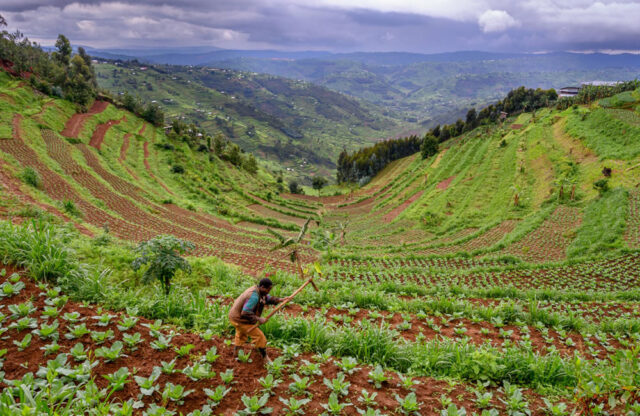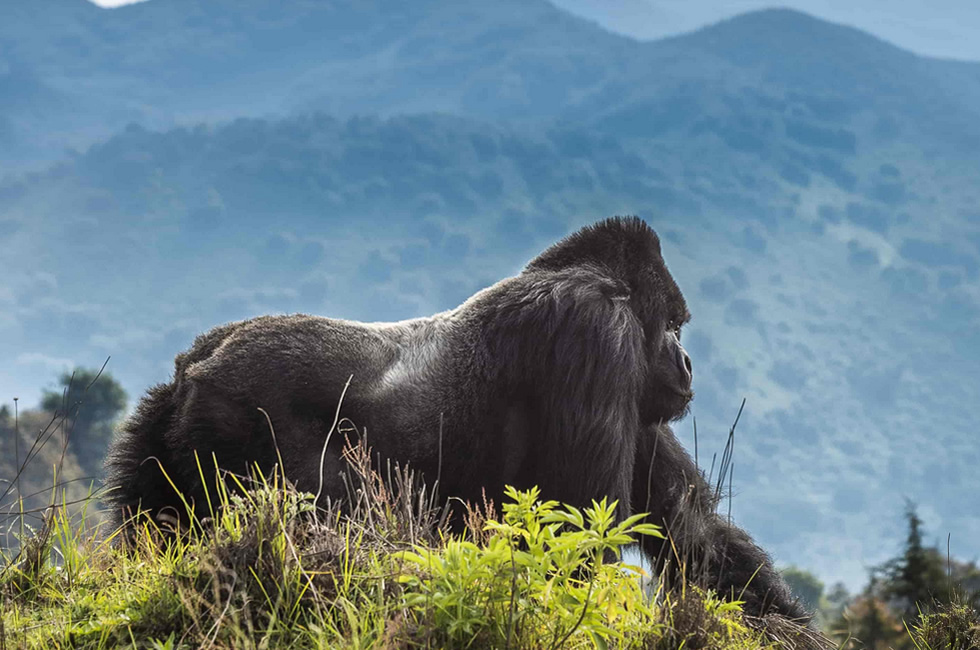Embarking on a safari in Rwanda offers a uniquely immersive experience into the heart of Africa’s biodiversity and conservation efforts. Renowned for its compact size yet rich diversity of landscapes and wildlife, Rwanda stands out as a premier safari destination, offering intimate encounters with iconic species amidst stunning natural backdrops. From the misty mountains of Volcanoes National Park, home to endangered mountain gorillas, to the savannah plains of Akagera National Park teeming with the “Big Five,” each safari in Rwanda promises not only thrilling wildlife sightings but also a deeper appreciation for the country’s commitment to sustainable tourism and wildlife conservation.
Mountain Gorilla Trekking in Volcanoes National Park
Unique Experience: Rwanda is world-renowned for its mountain gorilla population, and Volcanoes National Park is at the heart of gorilla conservation efforts. The park is part of the Virunga Massif, a volcanic chain spanning Rwanda, Uganda, and the Democratic Republic of Congo. Gorilla trekking here offers a rare opportunity to encounter these gentle giants in their natural habitat, amidst mist-shrouded slopes and dense forest canopies.
Conservation Focus: Rwanda has been a pioneer in gorilla conservation, with efforts focused on habitat protection, anti-poaching measures, and community involvement. The gorilla trekking experience is carefully managed to minimize impact on the gorillas and their environment, with strict guidelines on group size and duration of visits.
Visitor Experience: Trekking to see mountain gorillas involves a guided hike through rugged terrain, led by experienced trackers who locate the gorilla groups each day. The encounter is often described as profound and moving, as visitors observe gorillas going about their daily lives feeding, grooming, and interacting within their family groups.
Primate Diversity in Nyungwe National Park
Chimpanzee Tracking
Nyungwe National Park, located in southwestern Rwanda, is a biodiversity hotspot known for its dense montane rainforest and rich primate diversity. Apart from chimpanzees, the park is home to 12 other primate species, including the endangered golden monkey and several species of colobus monkeys. Guided chimpanzee tracking excursions offer insights into primate behavior and the unique ecosystem of Nyungwe.
Canopy Walkway
Nyungwe boasts one of East Africa’s only canopy walkways, providing visitors with a bird’s-eye view of the forest canopy. Suspended bridges and platforms allow for immersive experiences amidst towering trees, offering glimpses of rare bird species and primates moving through the treetops.
Savannah Wildlife in Akagera National Park
Big Five Safari
Akagera National Park, located in eastern Rwanda, offers a contrast to the mountainous landscapes of Volcanoes and Nyungwe. The park encompasses savannah plains, woodlands, and lakes, providing habitat for a diverse range of wildlife, including the “Big Five”—elephants, lions, leopards, buffalos, and rhinos. The reintroduction of black rhinos in 2017 marked a significant conservation achievement and enhanced the park’s appeal for safari enthusiasts.
Boat Safaris
Exploring Akagera’s lakes, such as Lake Ihema, offers opportunities to observe hippos, crocodiles, and a variety of waterbirds up close. Boat safaris complement traditional game drives, providing a different perspective on the park’s diverse ecosystems and wildlife interactions.
Conservation and Community Engagement
Conservation Initiatives: Rwanda’s commitment to conservation is evident in its national parks, where rigorous conservation measures and community involvement support sustainable tourism practices. Revenue from gorilla trekking permits and park fees directly funds conservation efforts, habitat restoration, and anti-poaching initiatives.
Community Benefits: Local communities play a vital role in Rwanda’s conservation efforts, with initiatives focused on education, healthcare, and sustainable livelihoods. Community-based tourism projects provide opportunities for cultural exchange and economic empowerment, ensuring that conservation efforts benefit local people as well as wildlife.
Cultural and Historical Insights
Cultural Experiences: Beyond wildlife encounters, Rwanda offers opportunities to explore its rich cultural heritage and history. Visits to cultural villages near national parks provide insights into traditional lifestyles, crafts, and ceremonies, enhancing the overall safari experience with cultural immersion.
Genocide Memorials: Rwanda’s recent history includes the devastating 1994 genocide against the Tutsi. Memorial sites across the country, including in proximity to national parks, offer visitors a chance to learn about Rwanda’s journey of reconciliation and resilience, adding depth to their safari experience.
Accessibility and Infrastructure
Infrastructure Development: Rwanda has invested in tourism infrastructure, including accommodation options ranging from luxury lodges to eco-friendly campsites near national parks. Improved road networks and transportation services make it easier for visitors to access remote areas while ensuring comfort and convenience during their safari experience.
Safety and Security: Rwanda is known for its political stability and commitment to visitor safety, providing a secure environment for travellers exploring its natural attractions. Tourist facilities adhere to international standards, ensuring a seamless safari experience with a focus on safety and hospitality.
Conclusion: A safari in Rwanda offers a blend of wildlife diversity, conservation success stories, cultural richness, and immersive experiences that make it a unique and compelling destination. Whether trekking to see mountain gorillas in Volcanoes National Park, exploring the primate-rich forests of Nyungwe, or embarking on a Big Five safari in Akagera, visitors are treated to unforgettable encounters with some of Africa’s most iconic species within a setting committed to conservation and sustainable tourism. Rwanda’s dedication to protecting its natural heritage ensures that these experiences not only preserve wildlife but also support local communities and inspire visitors with the beauty and resilience of Rwanda’s landscapes and people.


